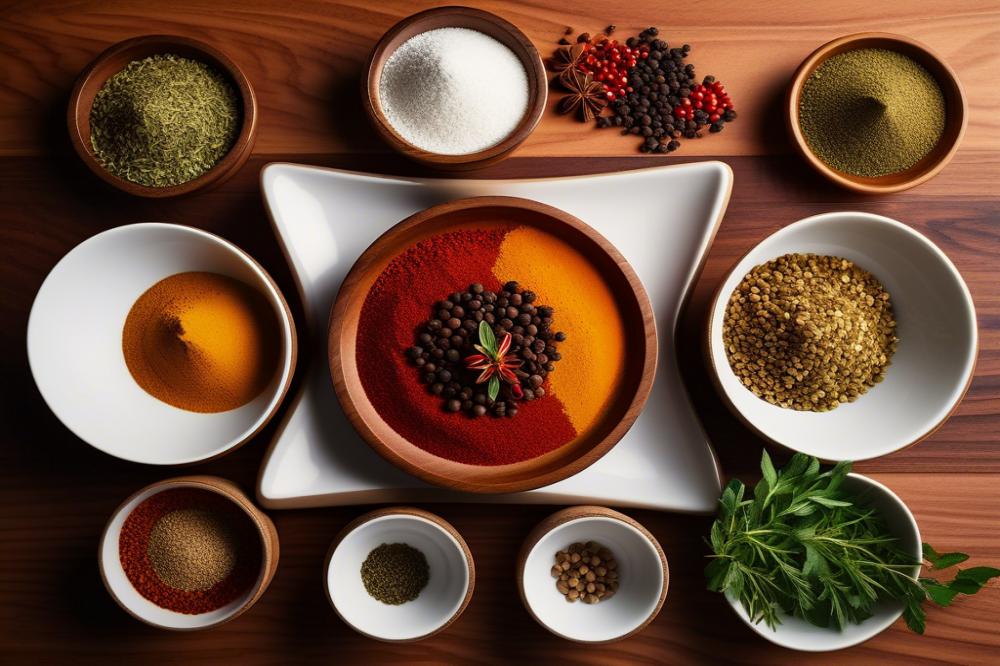Exploring the Traditional Spice Blends of Greece
Greece stands out as a remarkable destination for culinary travelers. With its rich history and vibrant culture, the country offers a feast for the senses. Visitors can indulge in flavors that reflect its sunny landscape and the warm Mediterranean climate. Culinary experiences in Greece are often tied to its ingredients, and spice blends play a crucial role in this delicious journey.
Spices and herbs are not just accessories in Greek cooking; they are essential components that define its character. They infuse dishes with deep flavors, creating connections between the past and the present. traditional spices such as oregano, thyme, and dill are commonly found in Greek meals. These ingredients often bring a burst of flavor to everyday dishes, enhancing the experience of dining.
Greek cuisine‘s charm lies in its heartwarming simplicity. Complex layers of taste emerge from the use of spices like cumin, coriander, and allspice. Each blend has its roots in regional history and local agriculture. For instance, cinnamon can add warmth to both sweet and savory dishes. Sumac, with its tangy taste, brings brightness to meals. By exploring these flavors, one can better appreciate the cuisine’s Mediterranean essence.
In taking a closer look at Greek spice blends, we uncover more than just seasonings. They symbolize the culture and traditions of Greece, connecting people through shared meals and cherished recipes. The use of these flavorful ingredients transforms ordinary dishes into extraordinary experiences. Each spice tells a story drawn from generations, making Greek cuisine a compelling chapter of culinary history.
Understanding Greek spice blends

In Mediterranean cuisine, spice blends are crucial. They define the flavors and aromas of dishes. Greek cooking is particularly known for its rich blend of spices and herbs, which enhance every meal. These blends are not just about taste; they also tell the story of history and culture.
Common Ingredients in Greek Spice Blends
Many ingredients are used to create these flavorful mixtures. oregano and thyme are staples, adding earthy notes. Cumin and coriander bring a warm, slightly citrusy flavor. Cinnamon and allspice introduce a hint of sweetness, balancing savory dishes perfectly. Sumac adds a tangy touch, while dill brings freshness. Each ingredient contributes to the final taste, reflecting Greece’s agricultural heritage.
The Role of Herbs and Spices in Enhancing Flavors
Herbs and spices play essential roles in cooking. They transform simple meals into extraordinary experiences. By using various blends, cooks can create distinct profiles for each dish. The bold flavors also leave a lasting impression on the palate. Whether in grilled meats, salads, or stews, these ingredients offer layers of taste that captivate food lovers. It’s fascinating how a pinch of something can change a meal entirely.
Popular Greek Spice Blends

In the realm of Greek cooking, certain spice blends stand out for their rich flavors and aromatic qualities. Oregano is one of the most prominent herbs used in many dishes. It adds a warm, earthy taste that is essential to Mediterranean cuisine. Thyme, with its slightly minty and lemony notes, complements various meats and vegetables beautifully. Both herbs are staples in the Greek pantry, often seen as a reflection of the country’s sunny landscapes.
Cumin also plays a significant role in Greek spice mixes. Often found in savory dishes, this spice introduces a warm, nutty flavor. It is commonly used in recipes for stews and roasted meats, bringing depth to the palate. Coriander, although used less frequently, is appreciated for its citrusy flavor that brightens dishes. It can be sprinkled into salads or used to season grilled vegetables, showcasing the versatility of these blends.
Other spices, like cinnamon and allspice, weave themselves into the fabric of Greek culinary traditions. These spices often find their way into sweet dishes, adding warmth and complexity. For example, cinnamon can elevate a simple rice pudding to something extraordinary. Meanwhile, allspice introduces a unique depth, especially in stews and marinades.
Sumac, another essential in Greek and Mediterranean cooking, provides a tangy kick. Its vibrant red hue adds a pop of color and flavor to salads and grilled meats. Dill, with its delicate and grassy notes, enhances fish dishes perfectly. This herb’s freshness is unmistakable in tzatziki, a classic Greek yogurt sauce that complements many meals.
Each of these blends reflects regional culinary traditions throughout Greece. In the islands, residents might favor lighter dishes seasoned with fresh herbs, while those in the mainland may lean more on robust flavors. The diversity in these spice combinations reveals much about the cultural influences and local ingredients unique to each area.
Health Benefits of Greek Spices

Greece boasts a variety of spices that are not only flavorful but also offer numerous health benefits. Cinnamon stands out as one of the most beneficial spices. It can help regulate blood sugar levels and is rich in antioxidants. People often use it to add warmth to both sweet and savory dishes.
Sumac, a tart red spice, brings a unique flavor to meals. It is known for its ability to support digestive health. Furthermore, it has antioxidant properties that combat inflammation, making it a valuable addition to any diet.
Allspice, with its aromatic blend of flavors, is another staple. It can relieve pain, especially in muscle soreness. Additionally, there is evidence that this spice can help aid digestion and reduce anxiety.
Nutritional Aspects of Key Spices
The nutritional benefits extend beyond taste. Oregano is loaded with vitamins and minerals. High in vitamin K, this spice is essential for bone health. Thyme also carries significant benefits. Its vitamin C content can bolster the immune system, keeping colds at bay.
Cumin and coriander have their own set of advantages. Cumin can facilitate digestion and help with weight loss, while coriander is known for its ability to lower blood sugar. By incorporating these spices into meals, one can reap both flavor and health benefits.
Role of These Spices in Traditional Medicine
In traditional medicine, herbs from Greece have played vital roles for centuries. Remedies made from these spices often address common ailments. For example, dill is commonly used for digestive issues, while oregano has been recognized for its antibacterial properties.
The rich history of these spices reveals their importance beyond the kitchen. Ancient Greeks frequently prescribed herbal teas made from thyme and sage for respiratory issues. Such traditions highlight the lasting relationship between food and health in Greek culture.
Health Benefits Associated with Mediterranean Cuisine
The Mediterranean diet emphasizes the use of spices along with fresh ingredients. This approach has been linked to reduced risk of heart disease. Full of healthy fats, fruits, and vegetables, this cuisine promotes overall wellness.
Many studies suggest that diets rich in these spices contribute to longevity. Their anti-inflammatory properties also play a crucial role in preventing chronic diseases. Incorporating these flavors can enhance both nutrient intake and health outcomes.
Incorporate these spices into daily meals. Use them in marinades, salads, and stews for added flavor and health benefits. The more one learns about these herbs, the more their advantages become clear. Enjoying Mediterranean cuisine can be a step towards better health.
Experiencing Greek Spice Blends While Traveling

Culinary Experiences and Local Markets in Greece
Traveling through Greece opens up a world of flavors. Strolling through local markets is one of the best ways to dive in. You’ll find vibrant stalls filled with fresh produce and aromatic herbs. Oregano, thyme, and dill are staples in many Greek households. Seeking out the traditional shops is key. Look for vendors who offer hands-on tastings. The experience becomes even richer when you interact with local sellers.
Taste and Purchase Recommendations
Sampling spice blends can be a journey of its own. Make sure to try specialty blends often used in Mediterranean cuisine. Cumin and coriander are essential for authentic Greek dishes. Consider purchasing pre-packaged spices to take home. Local shops often provide beautiful packaging, perfect for gifts. Prices can vary, so compare different stalls for the best deals. Don’t hesitate to ask for suggestions; locals love to share their favorites.
Cooking Classes and Workshops
Participating in cooking classes will deepen your understanding. Many culinary schools and even individual chefs offer workshops. Learning how to use spices like cinnamon and allspice in cooking can be transformative. Classes often include shopping trips to the market, allowing you to select your own ingredients. Expect to create dishes that reflect traditional flavors. Connecting with food this way creates lasting memories. Many programs will let you take home the recipes, so the experience doesn’t end when the class is over.
Visiting Greece offers more than historical sights; it’s a chance to connect with its rich culinary heritage. Spice blends play a significant role in making every meal unique. Engage with local traditions, and your tastebuds will thank you.
Final Thoughts
The role of spice blends in Greek culture is profound. They tell stories of tradition, history, and the rich heritage of the Mediterranean. Each blend used in recipes connects families and communities, giving meals a depth of flavor that goes beyond taste. Many dishes, from grilled meats to hearty stews, owe their character to these carefully crafted mixtures. Oregano and thyme are just a couple of the key players, enhancing every bite.
Readers are encouraged to dive into these flavors. Trying your hand at creating a Greek meal at home can be an exciting adventure. Consider visiting local markets to find spices native to the region, or attempt to recreate that delicious taverna experience in your kitchen. Exploring these tastes opens the door to understanding the culture behind each ingredient.
Culinary travel offers a unique opportunity to intertwine taste with cultural discovery in Greece. When traveling, consider more than just the sights. Engage with local cooks and artisans to truly grasp the essence of their cuisine. Uncover how spices reflect the land, its people, and their stories. By doing this, you create lasting memories, blending the joy of food with the richness of cultural experiences. Enjoy the journey of flavor and tradition in every dish!



